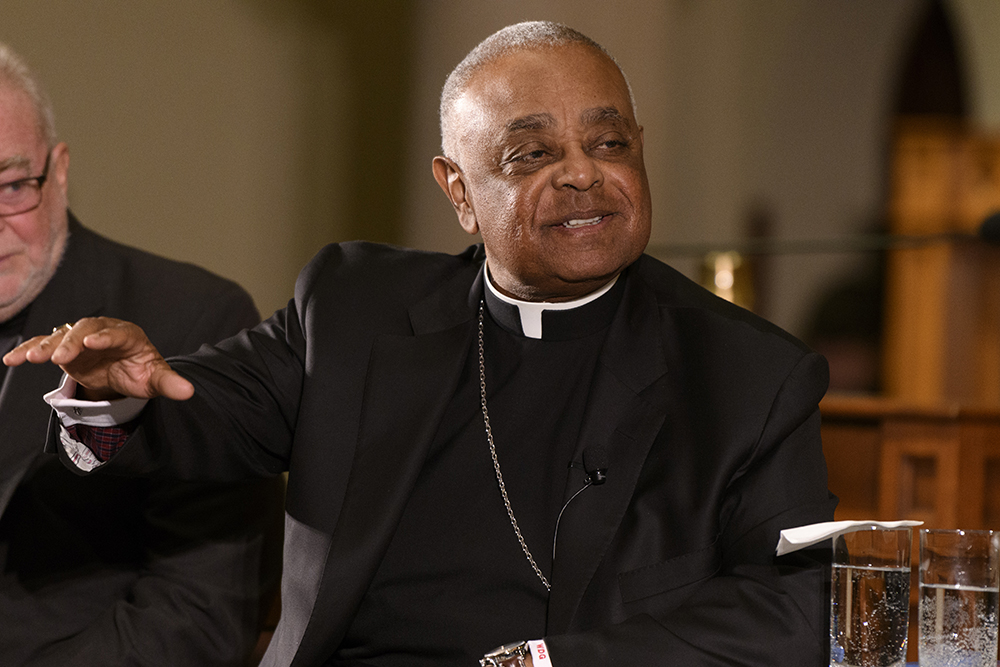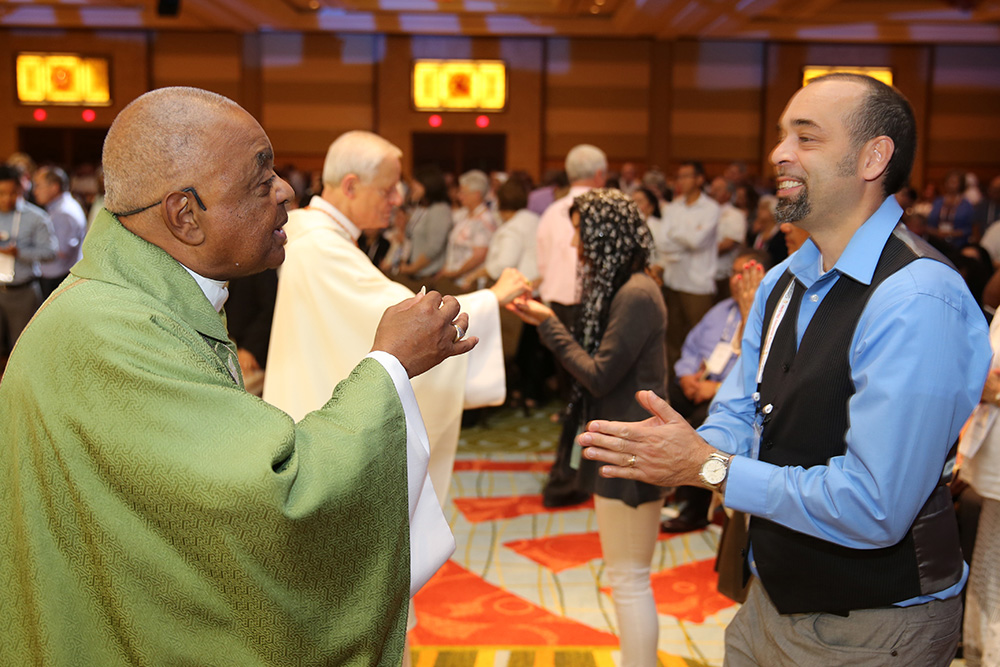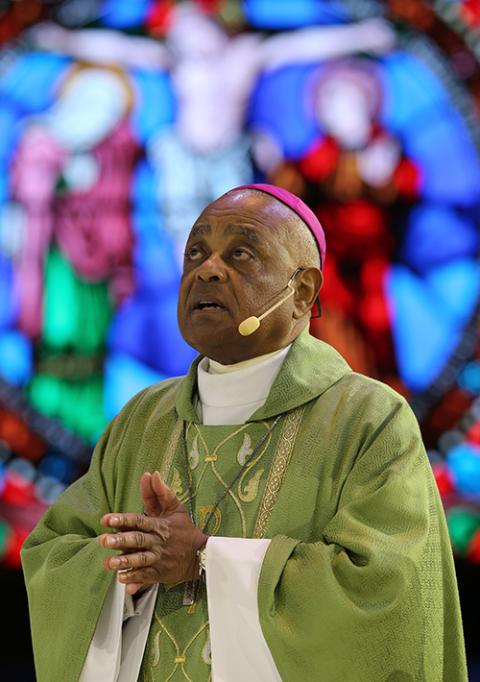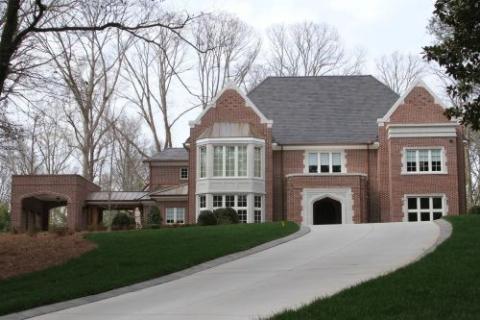
Atlanta Archbishop Wilton Gregory gestures during a panel titled "Confronting Racism in Our Hearts and in Our Nation" Nov. 13, 2017, at Georgetown University in Washington. (CNS/Georgetown University/Rafael Suanes)
Pope Francis has named Archbishop Wilton Gregory to lead the Washington Archdiocese, placing the prelate who guided the development of the U.S. bishops' procedures on clergy sexual abuse at the helm of a church that has been convulsed by abuse scandals over the past year.
In transferring Gregory from Atlanta, Francis has also appointed the first African American archbishop for the nation's capital, putting him in line to likely become the first black cardinal in the 230-year history of the U.S. church.
Announcement of the appointment, which had been rumored for the past week, was made in the Vatican's daily bulletin April 4. The archbishop is expected to hold a press conference later in the day.
Gregory, 71, has served as the archbishop of Atlanta since 2005.
A convert to Catholicism as a teenager, the archbishop is originally from Chicago, where he worked as a priest before being named an auxiliary bishop under the late Cardinal Joseph Bernardin. He later served from 1994 to December 2004 as the bishop of Belleville, in southern Illinois.
It was from Belleville that Gregory was chosen to lead the U.S. bishops' conference for a three-year term in 2001, placing him at the front of the American episcopate when the coverage of abuse scandals in Boston in early 2002 led to an unprecedented eruption of public outcry.
During the ensuing months, the then-bishop maneuvered his some 300 colleagues — including archbishops and cardinals years his senior — into creating a charter to establish uniform procedures for handling abuse cases. He also later shepherded negotiations with the Vatican to make some of those procedures binding norms for the American church.
Among Gregory's creations was the National Review Board, a standing lay-led committee charged with monitoring the bishops' implementation of the new procedures. One of its original members praised the pope's decision to name the former national president to take charge of the Washington Archdiocese.
"The archdiocese needs a healer. Wilton is definitely a healer."
— Nicholas Cafardi
"He really did a phenomenal job as the president to address the child sex abuse crisis," said Nicholas Cafardi, a civil and canon lawyer and former dean of Duquesne University School of Law.
"I think the past predicts the future," Cafardi told NCR. "The archdiocese needs a healer. Wilton is definitely a healer."
Also praising Gregory was Anne Burke, another member of the first National Review Board and fellow Chicago native, who said he never interfered with the board's investigation.
"That is a lesson that all the other bishops and cardinals of the U.S. should have taken from him: Let laypeople do what they know best," she said.
Gregory comes to Washington as the archdiocese is reeling from a remarkable series of revelations tied to the continuing abuse crisis over the past 10 months.
The last archbishop, Cardinal Donald Wuerl, resigned in October after a Pennsylvania grand jury report sparked outcry over his handling of abusive priests in the early 1990s. His predecessor, Theodore McCarrick, has been revealed as a serial sexual harasser and resigned from the church's prestigious College of Cardinals last July before being dismissed from the clergy altogether by Francis in February.

Atlanta Archbishop Wilton Gregory distributes Communion during Mass at the "Convocation of Catholic Leaders: The Joy of the Gospel in America" July 2, 2017, in Orlando, Florida. (CNS/Bob Roller)
One of Gregory's friends from his time in Chicago said she thought his appointment to Washington represented a "perfect fit" for the beleaguered archdiocese.
In 2002, the archbishop "spoke the truth" and was "prophetic" despite push-back from other prelates, said Daughter of Heart of Mary Sr. Anita Baird.
"If [the bishops] had maybe moved further, we wouldn't be in the situation we are in now," she said, referring to the U.S. bishops' ongoing discussions on how to update Gregory's 2002 procedures to provide a transparent method of reporting in the future prelates like McCarrick who abuse their power to harm others.
John Carr, a former longtime director of the U.S. bishops' domestic and international policy programs who worked with Gregory, called the archbishop a "caring, faithful, strong and smart leader."
"Archbishop Gregory is a pastor who can help us deal with our hurt and anger and a leader who can help renew our sense of mission."
—John Carr
"Washington is both a demoralized diocese and a vital and diverse local church," said Carr, who now leads the Initiative on Catholic Social Thought and Public Life at Georgetown University.
"Archbishop Gregory is a pastor who can help us deal with our hurt and anger and a leader who can help renew our sense of mission," he said.
He also will be adept at navigating the politics of the nation's capital, said Fr. Michael Pfleger of Chicago, who has known Gregory for decades.
"He will not only handle it, but will be a real voice of conscience and faith in these times when I think our country suffers from spiritual laryngitis," he said.
'He brings people along'
Gregory grew up on Chicago's South Side where he attended the now-closed St. Carthage Grammar School. He attributes his conversion to Catholicism to the influence of the sisters who ran the institution.
The future archbishop attended the former Quigley preparatory seminary and then Mundelein seminary. He was ordained a priest at age 25 by Chicago's late Cardinal John Cody and went on to earn his doctorate in liturgy at Rome's Pontifical Athenaeum of St. Anselm.
After 10 years of pastoral work and stints as the master of ceremonies for both Cody and his successor, Bernardin, he was made an auxiliary bishop of Chicago by Pope John Paul II in 1983 and the bishop of Belleville by the same pontiff in 1993.
Fr. Louis Cameli, a Chicago priest who advises the city's current cardinal, Blase Cupich, said Gregory took a pastoral approach on arriving in Belleville, a small city across the Mississippi River from St. Louis, that served him well.
"They loved him because he was already ready to receive them, and listen to them," said Cameli. "That's a gift he has. He brings people along."
"He's very bright and has a good ear and he listens to people," said the priest. "I've never seen anyone who works harder or who is more sincere in trying to help people."
Advertisement
Raphael Middeke, who served as editor of Belleville's diocesan newspaper under Gregory, said the then-bishop connected with Catholics in southern Illinois.
"He interacted very easily with people," said Middeke, describing Gregory as "confident yet collaborative."
The former editor also praised Gregory's handling of abuse cases, even before 2002, saying he was "very decisive in being open and addressing the issue head on."
Susan Reynolds, an assistant professor of Catholic studies at Emory University's Candler School of Theology, said she has been grateful for Gregory's efforts to focus on racial justice both in Atlanta and beforehand.
The theologian pointed to the archbishop's work on the 1984 pastoral letter from what were then the country's 10 African American bishops.
The letter, titled "What We Have Seen and Heard," focused on the richness of the black Catholic experience, despite a history of bondage and racism, and called on those who are "the children of pain [to] be now a bridge of reconciliation."
"Obviously, his legacy as president of the USCCB in 2002 … is been seen as the most salient feature of his biography in this particular moment," said Reynolds. "But I think his work and his words on racial justice are an equally vital part of his legacy."
Fr. Patrick Smith, who leads a Washington, DC parish that traces its founding to the efforts of a group of emancipated black Catholics in 1858, called Gregory's appointment a "source of hope" for African Americans.
"Having as the chief shepherd of the Church of Washington someone who knows from firsthand experience what it is like to be black in the United States and in the Church … is unprecedented," said Smith, pastor of St. Augustine Catholic Church in the city's northwest.
Gregory's appointment comes on the 51st anniversary of the 1968 assassination of Martin Luther King, Jr.
In a 2018 homily for a Mass on the civil rights icon's federal holiday, the archbishop said that the country's political scene today "is as problematic as it was in 1968." He mentioned in particular the "MeToo" movement's revelations about abuse of women and sloganeering against migrants.

Atlanta Archbishop Wilton Gregory concelebrates Mass during the 2017 Catholic convocation in Orlando, Florida. (CNS/Bob Roller)
But Gregory called on people to be hopeful, pointing to the promises Jesus makes in the beatitudes.
"The beatitudes present an icon of hope that must sustain us all until Christ is all in all," said the archbishop. "For surely, he will overcome, not in just words of song, but in due course with a lasting victory of justice."
'You'll never be a cardinal'
Gregory first came to wider public attention in April 2002, when as president of the bishops' conference he was called to Rome to take part in an unprecedented summit on clergy sexual abuse with Pope John Paul II and 12 of the then 13 U.S. cardinals.
As the prelates were returning home, Time magazine named Gregory its "Person of the Week" April 25, 2002, citing his role at the Rome meeting and as one of the first bishops to speak of clergy abuse as a crime and to apologize directly to survivors.
At a June 2002 meeting of the U.S. bishops held in Dallas, Gregory achieved unanimous passage of the "Charter for the Protection of Children and Young People," which promises that accused clergy will be "promptly" suspended from ministry and that even a single proven act of abuse will result in the person's permanent removal.
Gregory got the binding norms passed at a November 2002 meeting of the bishops, following the work of a mixed commission of Vatican officials and U.S. prelates to answer some of the Vatican's concerns about the new procedures.
Fr. Clete Kiley, a Chicago priest who worked for the bishops' conference from 1997 to 2006 and was a staff person for what was originally the Ad Hoc Committee on Sexual Abuse, praised Gregory as a leader.
Kiley, who has been friends with the archbishop since they were in seminary together, said: "If I could have picked someone for Washington, I would have picked Wilton, because of what he's done on … sex abuse."
The priest said that Gregory "always had his feet on the ground." Mentioning that the archbishop did his doctoral studies in Rome, where some priests can develop a sense of clerical entitlement, Kiley joked: "He came back normal."
Coming to Atlanta in 2005, Gregory has overseen a boom in Catholicism in the area, thanks primarily to the growth of the city in the latter half of the 20th century. An archdiocese that counted about 31,000 Catholics in 1960 now numbers some 1.15 million.
In fact, by most measures, Washington, which spans the territory of the nation's capital and five counties in southern Maryland, is a smaller archdiocese than Atlanta, which covers the entire northern half of the state of Georgia.

Atlanta Archbishop Wilton Gregory's residence pictured March 15, 2014 (CNS/Georgia Bulletin/Michael Alexander)
According to the Vatican's 2019 Annuario Pontificio, the official directory of the global church, the Washington Archdiocese contains some 2.3 million people, 659,000 of whom are Catholic.
But likely due to its status as the headquarters of many religious orders and a location for several Catholic colleges, Washington has multiples more clergy than Atlanta: more than double the number of diocesan priests, 389 versus 183; four times the number of religious priests, 460 versus 93; and four times the number of sisters, 468 versus 82.
Gregory came under sharp criticism in 2014 after the Atlanta Archdiocese spent more than $2 million to build a new archbishop's residence, after receiving a donation of some $15 million from a family member of Gone with the Wind author Margaret Mitchell.
The archbishop apologized for the decision, writing in a March 2014 edition of his weekly column that he had not fully considered the example he was setting in approving the move.
The territory of Washington, D.C., was originally part of the Baltimore Archdiocese, the country's first Catholic diocese. Pope Pius XII created a separate Washington Archdiocese in 1939, but charged Baltimore Archbishop Michael Curley to lead both dioceses.
The Washington Archdiocese received its first residential archbishop in 1947 with the appointment of Archbishop Patrick O'Boyle, who was made a cardinal by Pope Paul VI in 1967. Every archbishop of Washington since has been made a cardinal.
It appears unlikely that Francis would choose to make Gregory a cardinal before Wuerl turns 80, the age at which cardinals can no longer participate in possible conclaves, in November 2020.
Among the others Gregory tapped to take part on the U.S. bishops' first National Review Board was former Oklahoma Gov. Frank Keating, who served as its founding chairman.
Keating recalled accepting the appointment from Gregory, and telling him at the time: "If we do this right, you'll never be a cardinal, and I'll never be a Knight of Malta."
The former governor is today a member of the Knights.
[Joshua J. McElwee is NCR Vatican correspondent. His email address is jmcelwee@ncronline.org. Heidi Schlumpf is NCR national correspondent. Her email address is hschlumpf@ncronline.org. John Gehring contributed to this report.]









